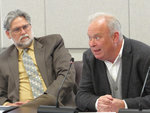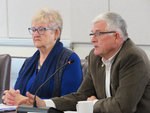

Local governments’ struggles to collect fees imposed by the court system and the effects of that on their budgets was one of the top items of discussion Friday at Lewis County’s fifth annual Legislative Roundtable at the Lewis County Courthouse.
County Clerk Scott Tinney said court rulings and “legislative changes” on the state level have “hamstrung” judges, making it difficult to assign or recover fees from people convicted of crimes. He asked the legislators on hand to adopt “a fix” to pay for the costs associated with the detainment of individual offenders.
“The funding the county has historically relied on is drying up,” Tinney said. “They have to look at other areas where they can cut their spending on the services that are typically spent for the citizen. It inhibits the ability to recruit and retain the quality of employee because we can’t keep up with wages in other jurisdictions.”
Tinney added that smaller counties could be headed for crisis if revenue streams from court fees completely evaporate.
The law Tinney was referring to resulted from the passage of House Bill 1783, signed into law in March, 2018 by Gov. Jay Inslee.
The law prohibits municipalities from jailing individuals who fail to make payments on court-imposed legal financial obligations (LFOs), restricts courts from imposing interest on fees other than restitution and prohibits judges from imposing certain fees on defendants determined to be “indigent,” meaning they cannot afford the cost of their defense.
As soon as the law was passed in 2018, county officials expressed concern that it would hurt the county financially, as well as take away a sentencing option for judges and potentially a deterrent to commit crimes in the first place.
Sheriff Rob Snaza claimed that the inability of judges to impose financial penalties has led to increased incarcerations at the Lewis County Jail.
The population growth, said Snaza, has resulted in placing a heavier burden on jail staff, as he counted 80 detainees for every corrections officer.
“So now, you’re talking about as they get incarcerated, they have a tendency to have medical issues, which we pay for,” he continued. “When the courts are unable to do what their job used to be, it now has a ripple effect on how it affects us. We continue to face that and until there’s a fix, we will see our ADP (adult population) in our facility go up, costs will go up— whether it’s medical or other means. This has no end in sight.”
Snaza said the county is struggling to pay more than $1 million a year in medical costs for inmates while losing government grants that assist in footing the bill for medication that’s dispensed to the inmate population.
Officials in attendance also noted that drivers have little incentive to follow traffic laws when they cannot be jailed for not paying fines, as defined in the new law.
For example, while driving without car insurance is not legal and results in a $450 fine if a driver is caught, there is no real penalty for not paying the fine under the law.
Sen. Dean Takko (D-Kelso) said many non-insured drivers “have never broken the law.”
He asked the audience of state and county officials to understand the situation low-income individuals are living in from the standpoint that they don’t have any assets to protect.
“They just don’t want to buy insurance because they don’t have anything to insure,” he said.
Jackson disagreed with Takko’s assessment by affirming: “Senator, with all due respect, I think you might be missing the point. The point is there is no incentive for these individuals to get insurance. It’s not a question of whether they can or not … Until we change how we do business with this, this is going to be a problem.”
Jackson said that forcing offending drivers to pay their fines — no matter how small — would be the best deterrent for the uninsured and individuals who are incurring citations.
Rep. Jim Walsh (R-Aberdeen) sided with Jackson, saying how a “lack of accountability” has become the dominant feature of Washington’s justice system.
“This is something that starts at the top of the executive branch of the state and its goal is to make lawlessness palatable — it is philosophically wrong. The practical reality that the county has to deal with is just the fallout — they’re the collateral damage,” he said. “You can’t disassemble the justice system and expect it to operate differently. We need to restore a sense of law and order. We need to restore a sense of accountability that individuals must bear and that’s not a heartless thing. That’s the best way to get a person back on the right track.”
Dawes, himself a former member of law enforcement, made his case against government leniency in addressing uninsured motorists.
“The changes I’ve seen in the past 15 in law enforcement truly scares me,” he began. “We’re struggling in our municipal court because our judge is very good, but there’s the law that says, ‘If you can’t pay for it, we can’t collect it.’ I couldn’t go up to somebody in the City of Chehalis and say, ‘You know what? Because you’re responsible and you do what you’re supposed to do, I’m going to make you pay for all the people who don’t want to do it.’ … I don’t mind being held accountable for my mistakes. I do get a little ticked off when I have to be held accountable for people who just don’t give a darn.”